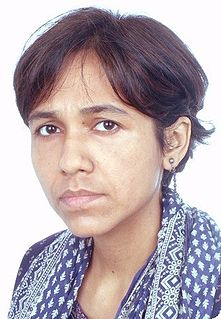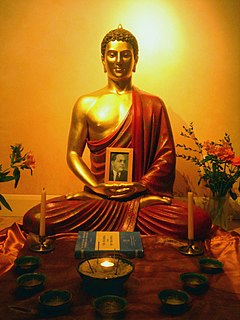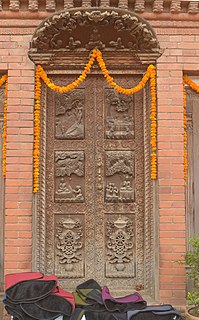
The Buddha was a philosopher, mendicant, meditator, spiritual teacher, and religious leader who lived in Ancient India. He is revered as the founder of the world religion of Buddhism, and worshipped by most Buddhist schools as the Enlightened One who has transcended Karma and escaped the cycle of birth and rebirth. He taught for around 45 years and built a large following, both monastic and lay. His teaching is based on his insight into duḥkha and the end of dukkha – the state called Nibbāna or Nirvana.
The purpose of this timeline is to give a detailed account of Buddhism from the birth of Gautama Buddha to the present.

Journey to the West is a Chinese novel published in the 16th century during the Ming dynasty and attributed to Wu Cheng'en. It is one of the Four Great Classical Novels of Chinese literature. It has been described as arguably the most popular literary work in East Asia. Arthur Waley's abridged translation, Monkey, is known in English-speaking countries.

Siddhartha is a 1922 novel by Hermann Hesse that deals with the spiritual journey of self-discovery of a man named Siddhartha during the time of the Gautama Buddha. The book, Hesse's ninth novel, was written in German, in a simple, lyrical style. It was published in the U.S. in 1951 and became influential during the 1960s. Hesse dedicated the first part of it to Romain Rolland and the second part to Wilhelm Gundert, his cousin.

Spring, Summer, Fall, Winter... and Spring is a 2003 South Korean film directed by Kim Ki-duk about a Buddhist monastery that floats on a lake in a pristine forest. The story is about the life of a Buddhist monk as he passes through the seasons of his life, from childhood to old age.

Rāhula was the only son of Siddhārtha Gautama, and his wife and princess Yaśodharā. He is mentioned in numerous Buddhist texts, from the early period onward. Accounts about Rāhula indicate a mutual impact between Prince Siddhārtha's life and the lives of his family members. According to the Pāli tradition, Rāhula was born on the day of Prince Siddhārta's renunciation, and was therefore named Rāhula, meaning a fetter on the path to enlightenment. According to the Mūlasarvāstivāda tradition, and numerous other later sources, however, Rāhula was only conceived on the day of Prince Siddhartha's renunciation, and was born six years later, when Prince Siddhārtha became enlightened as the Buddha. This long gestation period was explained by bad karma from previous lives of both Yaśodharā and of Rāhula himself, although more naturalistic reasons are also given. As a result of the late birth, Yaśodharā needed to prove that Rāhula was really Prince Siddhārtha's son, which she eventually did successfully by an act of truth. Historian H.W. Schumann has argued that Prince Siddhārtha conceived Rāhula and waited for his birth, to be able to leave the palace with the king and queen's permission, but Orientalist Noël Péri considered it more likely that Rāhula was born after Prince Siddhārtha left his palace.

The Other Boleyn Girl (2001) is a historical novel written by British author Philippa Gregory, loosely based on the life of 16th-century aristocrat Mary Boleyn of whom little is known. Inspired by Mary's life story, Gregory depicts the annulment of one of the most significant royal marriages in English history and conveys the urgency of the need for a male heir to the throne. Much of the history is highly distorted in her account.

Aṅgulimāla is an important figure in Buddhism, particularly within the Theravāda tradition. Depicted as a ruthless brigand who completely transforms after a conversion to Buddhism, he is seen as the example par excellence of the redemptive power of the Buddha's teaching and the Buddha's skill as a teacher. Aṅgulimāla is seen by Buddhists as the "patron saint" of childbirth and is associated with fertility in South and Southeast Asia.
Evolution is not explicitly mentioned in the Tipitaka. As no major principles of Buddhism contradict it, many Buddhists tacitly accept the theory of evolution. Questions about the eternity or infinity of the universe at large are counted among the 14 unanswerable questions which the Buddha maintained were counterproductive areas of speculation. As such, many Buddhists do not think about these kinds of questions as meaningful for the Buddhist goal of relieving oneself and others from suffering.
Samrat Upadhyay is a Nepalese writer, born in 1963, who writes in English. Upadhyay is a professor of creative writing and has previously served as the Director of the Creative Writing Program at Indiana University. He is the first Nepali-born fiction writer writing in English to be published in the West. He was born and raised in Kathmandu, Nepal, and came to the United States in 1984 at the age of twenty-one. He lives with his wife and daughter in Bloomington, Indiana.

Yaśodharā was the wife of Prince Siddhartha —till he left his home to become a śramaṇa—the mother of Rāhula, and the sister of Devadatta. She later became a bhikkhunī and is considered an arahatā.

Amita Kanekar is a Goa-based writer and architectural historian, whose well-received debut novel A Spoke in the Wheel was published by Harper Collins Publishers and later again by Navayana. Kanekar's second book was a guidebook to Portuguese sea fort architecture of the Deccan, while her third was another novel, Fear of Lions, published by Hachette in 2019. She also writes essays and newspaper columns on architecture, history, and politics, and also teaches architectural history and theory at the Goa College of Architecture.
Anne Donovan is a Scottish author from Glasgow best known for her novel being Emily. Her short story collection Hieroglyphics and Other Stories was published in 2001. This is currently one of the prose set texts for Scottish Literature in Scottish schools. A second novel, Being Emily, followed in 2008. Her most recent novel Gone Are The Leaves, was short-listed for the 2014 Saltire Scottish Literary Book of the Year Award.

Navayana means "new vehicle" and refers to the re-interpretation of Buddhism by B. R. Ambedkar. Ambedkar was born in a Dalit (untouchable) family during the colonial era of India, studied abroad, became a Dalit leader, and announced in 1935 his intent to convert from Hinduism to Buddhism. Thereafter Ambedkar studied texts of Buddhism, found several of its core beliefs and doctrines such as Four Noble Truths and "non-self" as flawed and pessimistic, then re-interpreted these into what he called "new vehicle" of Buddhism. This is known as Navayana, also known as Bhimayāna, after Ambedkar's first name Bhimrao. Ambedkar held a press conference on October 13, 1956, announcing his rejection of Theravada and Mahayana Buddhism, as well as of Hinduism. Thereafter, he left Hinduism and adopted Navayana, about six weeks before his death.
The Buddha was born into a noble family of the kshatriyas in Lumbini in 563 BCE as per historical events and 624 BCE according to Buddhist tradition. He was called Siddhartha Gautama in his childhood. His father was king Śuddhodana, leader of the Shakya clan in what was the growing state of Kosala, and his mother was queen Maya Devi. According to Buddhist legend, the baby exhibited the marks of a great man. A prophecy indicated that, if the child stayed at home, he was destined to become a world ruler. If the child left home, however, he would become a universal spiritual leader. To make sure the boy would be a great king and world ruler, his father isolated him in his palace and he was raised by his mother's younger sister, Mahapajapati Gotami, after his mother died just seven days after childbirth.
Events from the year 2003 in Scotland.

Āmrapālī, also known as "Ambapālika", "Ambapali", or "Amra" was a celebrated nagarvadhu of the republic of Vaishali in ancient India around 500 BC. Following the Buddha's teachings, she became an arahant. She is mentioned in the old Pali texts and Buddhist traditions, particularly in conjunction with the Buddha staying at her mango grove, Ambapali vana, which she later donated to his order and wherein he preached the famous Ambapalika Sutra. The legend of Amrapali originated in the Buddhist Jataka Tales some 1500 years ago.

The Buddhist traditions have created and maintained a vast body of mythological literature. The central myth of Buddhism is the life of the Buddha. This is told in relatively realistic terms in the earliest texts, and was soon elaborated into a complex literary mythology. The chief motif of this story, and the most distinctive feature of Buddhist myth, is the Buddha's renunciation: leaving his home and family for a spiritual quest. Alongside this central myth, the traditions contain large numbers of smaller stories, which are usually supposed to convey an ethical or Buddhist teaching. These include the popular Jātakas, folk tales or legends believed to be past lives of Gautama Buddha. Since these are regarded as episodes in the life of the Buddha, they are treated here as “myth”, rather than distinguishing between myth, legend, and folk-tale.

The Great Renunciation or Great Departure is the traditional term for the departure of Gautama Buddha from his palace at Kapilavastu to live a life as an ascetic. It is called the Great Renunciation because it is regarded as a great sacrifice. Most accounts of this event can be found in post-canonical Buddhist texts from several Buddhist traditions, which are the most complete. These are, however, of a more mythological nature than the early texts. They exist in Pāli, Sanskrit and Chinese language.

The Cheaper by the Dozen franchise consists of a series of films and stage adaptations, based on the real-life events of the Gilbreth family. Based on novels co-written by Frank B. Gilbreth, Jr. and Ernestine Gilbreth Carey, the series of movies include two biographical films and two loose-remake family comedy films inspired by their story. The general plot centers around the lives of parents with a large number of children. Each depicts familial relationships, and working through the challenges that arise with an over-sized household.














